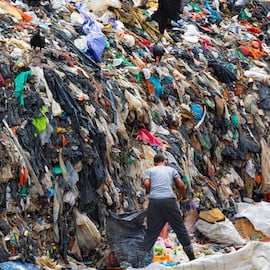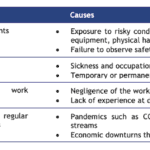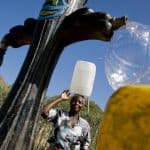Latin America and the Caribbean (LAC) is 1% round — far beneath the worldwide common of seven.2%. Which means of all of the supplies flowing by the area’s economic system, lower than 1% re-enter the economic system for a second life by restore, reuse, recycling or different means.
This fairly alarming quantity is a key discovering of the “Circularity Hole Report Latin America and the Caribbean,” which we at Circle Economic system Basis not too long ago launched. It marks the primary time we’ve utilized our trademark Circularity Metric — launched at a world degree in 2018 and later utilized to a number of international locations — to a particular area. However though the Circularity Metric represents our try to make progress towards circularity simpler to know by measuring it with a single determine, in areas like LAC, the truth is significantly extra nuanced than the quantity.
Though official statistics benchmark circularity at lower than 1%, the area is house to a bustling casual economic system — a community of avenue distributors, waste pickers, unregistered companies and extra, totalling 130 million employees and representing round 60% of the workforce. This degree of informality implies that there’s a variety of “hidden” actions that would impression the area’s circularity, in addition to unknown materials and carbon footprints.
Casual jobs lack official employment contracts or registration, which means entry to social safety is sparse and labour rights can go unrespected — however they’re additionally a world norm, using an estimated 2 billion folks worldwide. In some sectors and areas, these jobs are held by the overwhelming majority of employees: For instance, in LAC, a staggering 86% of agricultural employees are casual. However how does this relate to the round economic system?
The Challenges of Knowledge Assortment in Casual Round Economic system Work
When work is casual, it may be difficult to gather information to grasp its contribution to circularity. Many casual employees immediately contribute to the round economic system — by the resale of shopper items, the sorting of waste and the restore of broken or non-functional gadgets, for instance — with out these contributions being picked up in formal databases. Additional complicating this information assortment, sectors related to the round economic system worldwide usually have excessive charges of informality. The casual economic system has, at occasions, acted as an antithesis to the “extra, newer, cheaper” ethos of our present “take-make-waste” economic system. Typically stemming from necessity, actions carried out by casual employees are typically extremely environment friendly, maximising merchandise’ and supplies’ worth, as these employees tackle round actions which are largely missed or undervalued. And due to the function these employees play in recycling items and supplies — for example, by promoting second-hand merchandise — they’ve an unknown however probably massive impact on circularity.
Because of these components, it’s unlikely that LAC is definitely only one% round — however with no extra correct benchmark, it’ll be tough for the area’s 33 nations to set correct targets, limiting their capability to leverage the talents and experience held within the casual labour market and roll out extra formal round economic system initiatives. For that cause, information gaps related to LAC’s casual economic system perpetuate a vicious cycle: With out statistics on massive components of the working inhabitants, it’s onerous to get a real image of the round economic system within the area, or a transparent sense of whether or not present actions are efficient — or how they are often scaled. And with an enormous portion of financial actions invisible to policymakers, creating tailor-made methods to bolster round economic system actions and enhance working circumstances in them is difficult. So whereas the casual economic system is probably going a hidden goldmine of round practices, with out recognition and help, its potential will stay untapped — and employees inside it danger being undercut by insurance policies and initiatives designed solely with information on the formal economic system at hand.
It is a important missed alternative, as round initiatives are sometimes labour-intensive in sure sectors. The Circularity Hole Report factors to the massive potential for job creation in round economic system work in LAC: For example, almost 9 million new formal jobs may very well be created if the agrifood, constructed surroundings, mobility and waste administration sectors have been to go all-in on circularity. However the excessive prevalence of informality in these sectors implies that this transition’s impression on jobs might differ wildly — with out clear information, it’s powerful to inform how insurance policies driving the round transition will have an effect on work and employees, each formal and casual.
Supporting Casual Employees in Round Sectors
Nevertheless, regardless of these challenges in measuring circularity in LAC international locations, one factor is evident: Shifting to a round economic system provides the area a possibility to overtake extra than simply its modes of manufacturing and consumption. If designed with social justice in thoughts, it might probably additionally enhance employees’ livelihoods. For instance, underneath an inclusive round economic system, these at present working as casual waste collectors, dismantlers and recyclers could be concerned in social dialogues on the best way to rework economies for the higher. Their enter might assist make sure that round economic system insurance policies serve the wants of the nation or metropolis the place they’re being rolled out, for example by designing social safety and labour coverage to advertise higher working circumstances in focused sectors.
However whereas addressing informality (particularly inside round sectors, like restore and waste administration) can be essential, formalisation isn’t essentially the top objective: Many initiatives and companies throughout LAC are already offering worthwhile examples of how casual employees could be protected and uplifted inside present programs. Cataki, for instance — an app dubbed “Tinder for Brazil’s avenue recyclers” — matches native waste collectors (or catadores) to these with waste to discard. The typical Brazilian produces round 380 kilogrammes of stable waste every year, solely 3% of which is recycled — the overwhelming majority by waste pickers. The app helps these employees resolve what recyclables to select up, based mostly on kind and placement, whereas fostering higher social consciousness of and appreciation for catadores. Coverage efforts are additionally giving safety to casual employees within the area: For instance, one Chilean legislation has legitimised grassroots recyclers as important waste administration actors, whereas additionally mandating that companies should contribute to the formalisation, coaching and funding of those employees.
LAC international locations may also look past their borders for inspiration: The World Financial Discussion board’s International Plastic Motion Partnership, for instance, is utilizing know-how to measure the sort and amount of plastic that waste pickers are gathering in Ghana — bringing transparency to worth chains that may profit all stakeholders. This will uplift waste pickers by boosting their wages, since socially accountable firms pays a premium for so-called “social plastics.” It will probably additionally profit companies, as analysis exhibits that buyers are over 4 occasions extra seemingly to belief and advocate manufacturers which have a powerful objective.
The Partnership will even help taking part international locations in different methods: For instance, Ecuador, the primary nation in Latin America to affix, will obtain help in capacity-building by entry to international data and follow networks — hopefully with the additional advantage of uplifting casual employees. Apps, digital platforms and partnerships like these can be leveraged to gather and put information to work, slowly bridging gaps to make clear present benchmarks, design programmes and insurance policies, and set targets. Within the case of the Plastic Motion Partnership, for example, the brand new information collected will assist inform public authorities’ and policymakers’ choices on the place to construct new recycling crops.
Past Knowledge: Different Methods to Help LAC’s Casual Round Economic system Workforce
Partnerships present one supply of information that may shine a lightweight on the contributions casual employees make to the round economic system in LAC. However different efforts are additionally rising on the information entrance: For example, this 12 months’s Worldwide Convention of Labour Statisticians adopted new requirements to assist international locations accumulate higher information on the casual economic system. These requirements will assist each governments and companies create a clearer image of the casual economic system’s contributions to the round transition, offering an important piece of the puzzle in constructing a sustainable, resilient and socially simply round economic system in LAC.
However there are different ways in which casual employees could be uplifted whereas boosting circularity within the area, together with the next actions:
- Guaranteeing that the contributions of the casual sector are usually not missed, and giving these employees and their actions the popularity and safety they deserve. This might embrace working by cooperatives that spur collaboration, offering help to formalise enterprises and build up casual employees’ bargaining energy.
- Altering the narrative round casual work and employees. These employees are usually not really invisible: Many formal firms depend on informally-sourced inputs and providers to run their operations. Acknowledging the function these employees play within the worth chains of at this time and tomorrow is significant.
- Bringing casual employees to the desk, by giving them a say within the policymaking course of and thereby making certain that new insurance policies don’t unknowingly undercut them. These insurance policies must also give expert casual employees recognition and accessible alternatives for additional abilities growth.
By means of these and different actions — mixed with a concerted effort to enhance the amount and high quality of information accessible — the event group can help not solely casual employees, however all stakeholders in LAC’s round economic system. If these efforts are efficient, we hope that future reviews will reveal higher progress within the area’s round transition.
Ana Birliga Sutherland is a author and editor, and Esther Goodwin Brown is the lead of the Round Jobs Initiative at Circle Economic system Basis.
Photograph courtesy of Mussi Katz.



